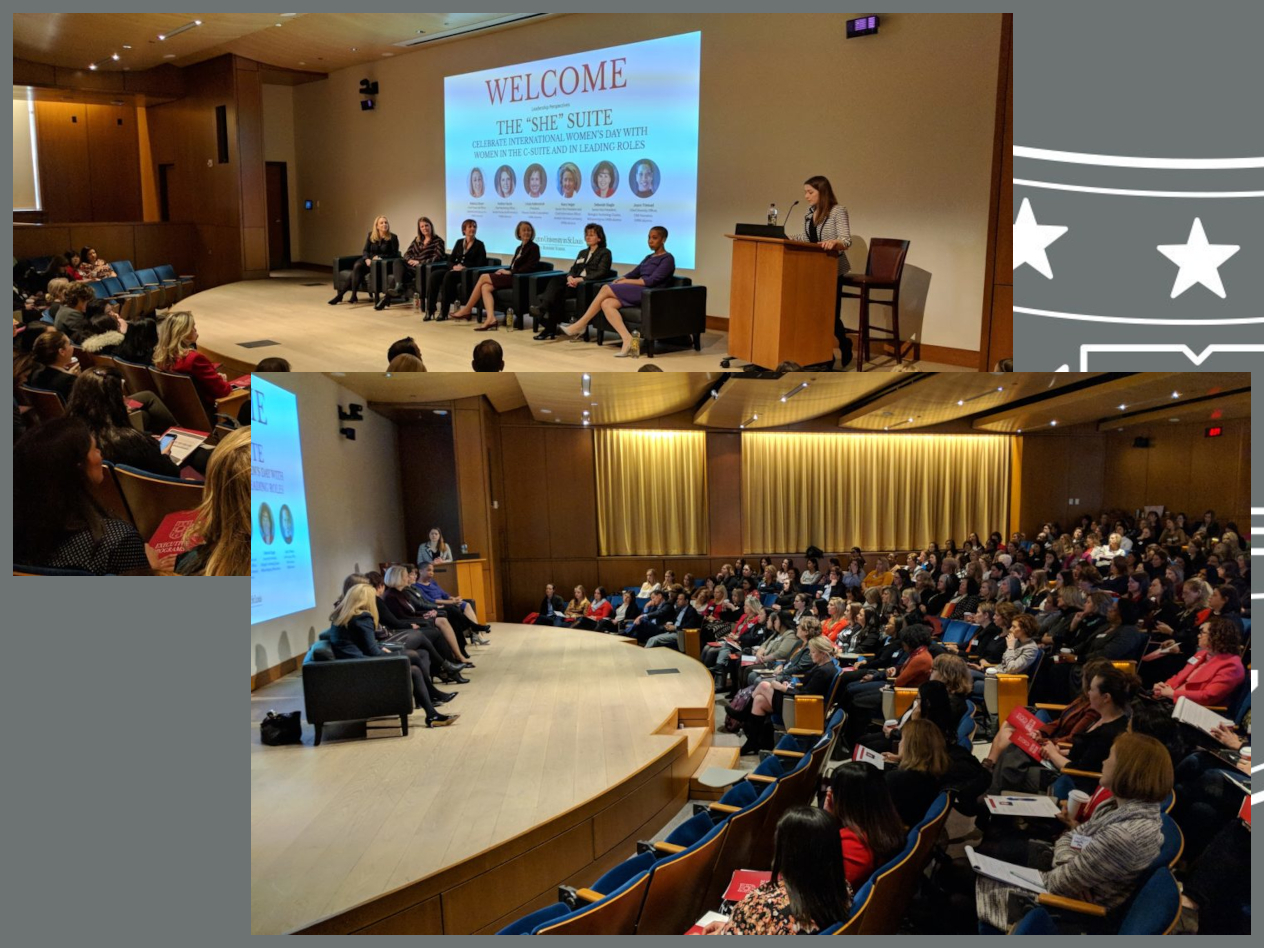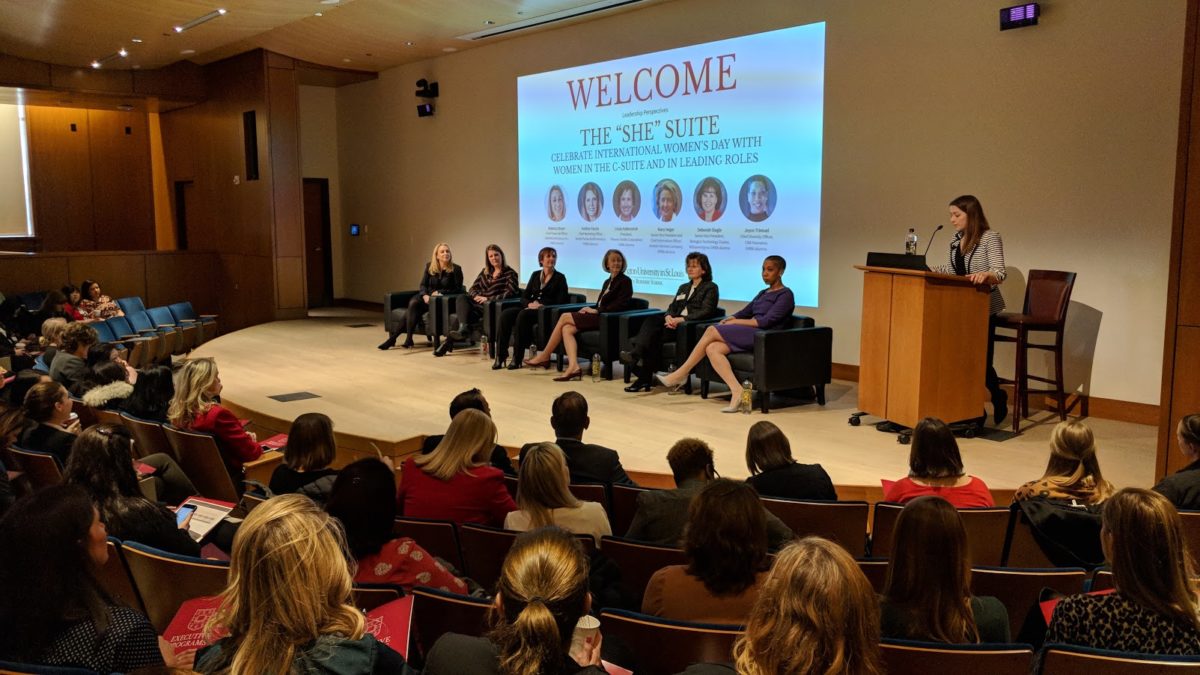6 successful women EMBAs, 6 nuggets of wisdom
- March 9, 2018
- By WashU Olin Business School
- 5 minute read

Tanya Yatzeck, EMBA 43, is a project manager in continuous improvement at Spire Inc. She wrote the following for the Olin Blog.
For International Women’s Day on March 8, the Executive MBA Leadership Series at Olin featured the “She Suite,” a panel of six women WashU EMBA graduates who have risen to the top of their organizations. For 60 minutes, these women answered questions about how their organizations work toward gender parity, how they dealt with challenges, and how they explain their successes.
On Risk Taking: “Your greatest achievements are out of your comfort zone”
Andrea Faccio, chief marketing officer at Nestle Purina North America, has risen to the top at Nestle and has worked in four different countries, but was most challenged by a manager at Nestle who asked her to take a role in an area in which she didn’t consider herself an expert.
“He offered me a job developing a strategy on nutrition. I looked at him and said, ‘I am NOT a nutritionist.’ He said, this is what I want. I want someone that can work with other people. I took the job and now I think it was my greatest achievement in part because since I wasn’t an expert, I had to ask people for help. If somebody offers you something that you’re not sure about, trust that they see something in you and that you can do it,” she said.
On Breaking the Rules: Nevertheless, she persisted
When Linda Haberstoh, president of Phoenix Textile Corporation, was considering the EMBA Program at Olin, she wasn’t sure it would help her because Phoenix is a small, family-owned business. She ultimately did it because, as she says, “I felt about an inch wide and a mile deep,” and credits the program with a wide range of her personal and business growth.
Joyce Trimuel, chief operations officer and chief diversity officer at CNA Insurance, asked for support from her leadership at a previous company to do the EMBA, and was told, “You don’t need an MBA to be successful here.”
Nevertheless, she persisted.
“This was so important to me, that I did it anyway. I was self-sponsored and used my vacation days for class, and I would do it again in a heartbeat. However, my brand took a hit. I was no longer the rule follower, I was the person who doesn’t listen,” Trimuel said. “So, what I ended up doing was working extra hard. I had to make sure that I didn’t compromise my team, or make any miss-steps. For the time that I was in school, I had my best performance at that company.”
On Setbacks: “I was willing to take a short-term hit to reach my long-term goal”
Trimuel acknowledges that her insistence on pursuing the EMBA resulted in a hit to her personal brand at that company. “The EMBA helped me become a better leader, but in terms of managing my personal relationships, I had ruined some and worked hard to repair them,” she said. “Sometimes you take a short-term setback in order to have long-term success and I was willing to do that.”
Rebecca Boyer, chief financial officer at KelliMitchell Group, made a choice to take a step back professionally for what looked like a better opportunity long term. Boyer found success very early as a financial professional, taking a controller position in her early 20s. She describes always telling people she was 30 in those days in order to avoid inevitable questioning of her authority for one so young.
“My next job, I took a role as senior accountant, but my gut told me it was a better opportunity,” Boyer said. “Ultimately, the opportunity included helping start four companies and shutting down a 75-year-old company. It was the right choice.”
On Diversity and Inclusion in Business: “Lead with the data”
As chief diversity officer at CNA, Trimuel spends a lot of time working on the problem of inclusion. She says you have to show leadership what is in it for them.
“There is so much data out there that can substantiate that companies that are very intentional about diversity and inclusion will outperform companies that take a more passive approach. Even if they don’t believe it’s just the right thing to do, numbers and data don’t lie. It’s going to help with the bottom line, it’s going to help with retention, it’s going to help with attracting new talent to your organization, and if you build that business case for it, people are much more likely to get on the bus, and for it to be a more sustainable culture shift for your organization.”
On Culture: “The values of the organization matter”
After a long, successful career at Ameren, Mary Heger, chief information officer, looks back and understands why she is still there.
“I think about my career, I was not one who had a goal from the get-go, grand plan. I started work, I found positions that I loved, and I gave it my all in terms of learning the business,” Heger said. “I looked for opportunities for education and opportunities to prepare myself for the next step, I was willing to take the risk of working in an area that I wasn’t familiar with—it’s what we all have to do to get that experience. I worked at an amazing company whose values lined up with mine that I think is absolutely critical.”
On Gender Differences in Business: “Don’t cry until you get to the elevator”
Linda Haberstroh has a unique perspective on the textile industry, which is still a very male dominated industry. Phoenix Textiles is an anomaly, and has been since it was founded by her mother in 1983. She is pleased to report that the business they do now with mills in India and Pakistan involves many women-led companies and that it’s exciting to see women stepping up globally.
“My mom is the founder, our fiduciary board is a majority of women, my fellow shareholders of our privately held family business are my sisters. Our executive leadership team is 50/50, and our joke is we are looking for a few good men so we can have gender parity,” she said. “When my mom was trying to get the mills to open up, she would go down to New York every week and try to get them to talk to her, and she would hear ‘no’ every week. Every week she would go back. Every time, they would tell her no she would always say to herself, ‘Don’t cry until you get to the elevator, don’t cry until you get to the elevator.’ Finally after the first company went with us and we were able to get that crack, and a place in the marketplace, we were on our way.”
International Women's Day "She Suite"
Take a peek at some of the scenes from this successful event featuring six women on top of their leadership game.
Media inquiries
For assistance with media inquiries and to find faculty experts, please contact Washington University Marketing & Communications.
Monday–Friday, 8:30 to 5 p.m.
Sara Savat
Senior News Director, Business and Social Sciences

